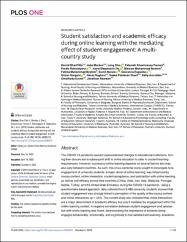| dc.contributor.author | Nia, Hamid Sharif | |
| dc.contributor.author | Marôco, João | |
| dc.contributor.author | She, Long | |
| dc.contributor.author | Görgülü, Özkan | |
| dc.contributor.author | Allen, Kelly-Ann | |
| dc.contributor.author | Kaveh, Omolhoda | |
| dc.contributor.author | Reardon, Jonathan | |
| dc.date.accessioned | 2023-11-30T12:21:24Z | |
| dc.date.available | 2023-11-30T12:21:24Z | |
| dc.date.issued | 2023 | en_US |
| dc.identifier.citation | Sharif Nia, H., Marôco, J., She, L., Khoshnavay Fomani, F., Rahmatpour, P., Stepanovic Ilic, I., ... & Reardon, J. (2023). Student satisfaction and academic efficacy during online learning with the mediating effect of student engagement: A multi-country study. PloS one, 18(10), e0285315. | en_US |
| dc.identifier.issn | 19326203 | |
| dc.identifier.uri | https://doi.org/10.1371/journal.pone.0285315 | |
| dc.identifier.uri | https://hdl.handle.net/20.500.12513/5375 | |
| dc.description.abstract | The COVID-19 pandemic caused unprecedented changes to educational institutions, forcing their closure and a subsequent shift to online education to cater to student learning requirements. However, successful online learning depends on several factors and may also vary between countries. As such, this cross-sectional study sought to investigate how engagement of university students, a major driver of online learning, was influenced by course content, online interaction, student acceptance, and satisfaction with online learning, as well as self-efficacy across nine countries (China, India, Iran, Italy, Malaysia, Portugal, Serbia, Turkey, and the United Arab Emirates) during the COVID-19 pandemic. Using a questionnaire-based approach, data collected from 6,489 university students showed that student engagement was strongly linked to perception of the quality of the course content and online interactions (p < .001). The current study also indicated that online interactions are a major determinant of academic efficacy but only if mediated by engagement within the online learning context. A negative correlation between student engagement and satisfaction with online learning was found, demonstrating the importance of students being engaged behaviorally, emotionally, and cognitively to feel satisfied with learning. Academic efficacy and student satisfaction were explained by course content, online interaction, and online learning acceptance, being mediated by student engagement. Student satisfaction and, to a lesser degree academic efficacy, were also associated with online learning acceptance. Overall, the structural equation model was a good fit for the data collected from all nine countries (CFI = .947, TLI = .943; RMSEA = .068; SRMR = .048), despite differences in the percentage variations explained by each factor (no invariance), likely due to differences in levels of technology use, learning management systems, and the preparedness of teachers to migrate to full online instruction. Despite limitations, the results of this study highlight the most important factors affecting online learning, providing insight into potential approaches for improving student experiences in online learning environments. © 2023 Sharif Nia et al. This is an open access article distributed under the terms of the Creative Commons Attribution License, which permits unrestricted use, distribution, and reproduction in any medium, provided the original author and source are credited. | en_US |
| dc.language.iso | eng | en_US |
| dc.publisher | Public Library of Science | en_US |
| dc.relation.isversionof | 10.1371/journal.pone.0285315 | en_US |
| dc.rights | info:eu-repo/semantics/openAccess | en_US |
| dc.title | Student satisfaction and academic efficacy during online learning with the mediating effect of student engagement: A multicountry study | en_US |
| dc.type | article | en_US |
| dc.relation.journal | PLoS ONE | en_US |
| dc.contributor.department | Tıp Fakültesi | en_US |
| dc.contributor.authorID | Özkan Görgülü / 0000-0002-6802-4450 | en_US |
| dc.identifier.volume | 18 | en_US |
| dc.relation.publicationcategory | Makale - Uluslararası Hakemli Dergi - Kurum Öğretim Elemanı | en_US |


















